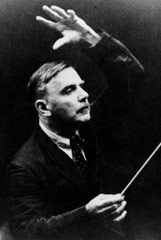|
|
 |
 |
 |
Music had had an important role in Hesse's life since his childhood. In his parents home they played music. The mother played the piano and sang, the children learnt to play an instrument and together played concerts at home. Hermann devoted to violin until he was 15, then passed the instrument to his brother Hans. His active relation to music stopped.
Yet he remained a keen listener all his life. His first wife, Mia, played the piano, so that, already at the time of Gaienhofen, the family could enjoy music even without a grammophon or radio.
Until the end of the twenties, in Basel and Bern, Hesse made friends with many musicians, composers and singers. He listened to numerous of their concerts or concerts together with them, he discussed about music and composers, learnt from them, he used to appreciate them as travelling companions in his trips to Italy.
His most important musician friends were: Othmar Schoeck, Fritz Brun, Alphonse Brun, Volkmar Andreae, Ilona Durigo and Hermann Suter.
|
|
 |
 |
 |
In the following years, when Hermann Hesse's life became more sedentary with aging, radio concerts became more and more important.
Even though in The Steppenwolf there is s reference to radio as capable of broadcasting only a «disgusting mucilage» of sounds, Hesse consciously enjoyed his favourite music pieces, in particular on holidays such as Easter, Pentecost and Christmas.
When he was young he appreciated among many composers Chopin, as well as Brahms and Wagner, from whom he, later on, moved away, in particular from Wagner.
All his life he loved Schubert, Schumann and Händel, and specially Mozart and Johann Sebastian Bach.
Among the composers who set to music Hesse's poems, he admired and praised only his friend Othmar Schoeck.
|
|
 |
|
|
 |
Hesse with his circle of Swiss artists friends in Bern, 1913.
Upper row from left: Leonie Stämpfli, Mia Hesse, Helen Schädelin
Middle: Ilona Durigo, unknown, Hermann Hesse, Walter Schädelin, Wilhelm Stämpfli
Sitting: Othmar Schoeck, Fritz Brun, Alphonse Brun.
|
|
 |
|
|
 |
|